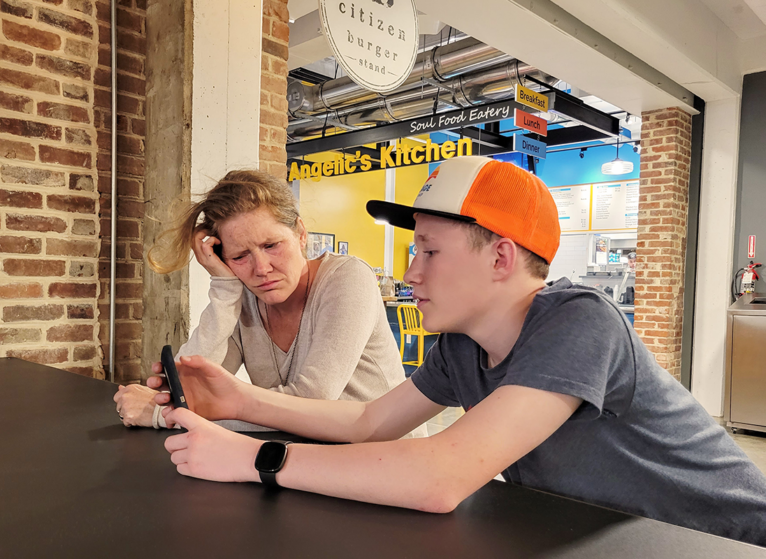I have teenagers. The colored hair, the rolled eyes, the talking back — none of that surprises me. But several unique Gen Z characteristics baffle me.
And it’s not just my kids. I swap stories with other parents, and we all see the same thing. Everything is fluid and expansive to these kids — their identities, their vocabularies. But when it comes to adolescent development, they’re like players on the bench. They’re sitting this one out.
Something’s going on with Gen Z, we whisper. They know so much; they do so little. What’s wrong with them?
Nothing, according to Haley Stephens, PhD. In fact, in her mind, they’re “brilliant and resilient.” I spoke with her to try and understand this conclusion.
Gen Z Characteristics
Our kids seem reluctant to bust out into the world, learn to drive, seek adventure. Left to their own devices — quite literally — they’ll steep in the glow of their phones for hours.
They use labels that didn’t exist when we were high school: neurodivergent, pansexual, nonbinary. They call out toxic masculinity and structural racism.
While their vocabulary to describe forces of politics and culture is sophisticated and worldly, they seem content to stay in their bedrooms, watching from a safe distance. “Are they ever going to leave?” my wife groans.
We’re confounded. When we were 16, we couldn’t wait to drive. Gen X adults remember early years of risk-taking and pushing against our parents’ rules, with equal parts ruefulness and wistfulness.
None of us want our kids to go against the rules. But experimentation shaped who we are. When we were kids, we had to go through rough times. Rites of passage tested the mettle of our beliefs. We look at our children and worry they’ll never break out of the cocoon if they never break anything. We wonder what we’ve done wrong. Or that something’s wrong with this generation.
When I talk to Stephens, she laughs in recognition. “I couldn't wait to get my license. I couldn't wait to get my first job. And I was just so excited for these things.”
Like me, interacting with teens makes her feel “like that old grumpy person. I push myself to reframe my thoughts and contextualize.”
She gives me the bigger picture.
Why Gen Z is Slow Growing
Most parents have witnessed their kids’ physical development happening faster than expected. Which makes it all the more confusing to find that “kids are socially and behaviorally developing more slowly,” Stephens says. “They're less likely to want to hit milestones.”
Fewer teens are:
- Getting part-time jobs
- Having sex
- Drinking alcohol
- Learning to drive
Why? A shift in demographics and parenting. We’re different and the way we parent is different, so our kids are different.
“A slow life development is more common when families have fewer children, more time to cultivate each child's growth and development. Families now have 2 children on average. We structure opportunities for them to prepare them for college. Organized sports are starting earlier,” Stephens says. “And so it makes sense that our children are not hitting the milestones at the same pace.”
Stephens contrasts this to the mid-20th century, when the average woman had 4 kids. Parents “had a lot less time to devote to each child’s development. Kids were on their own. So they moved faster through these milestones.”
Slower maturation has positives, like a lower teen pregnancy rate. We tell our teens to slow down — and they are.
“They’re slowing down, and they're in less of a hurry to do the kind of anxiety-provoking things that adults do,” Stephens says.
“And by the way,” she adds. “We’re finding these trends to be true across economic and social spectrums. This isn’t just a white, upper-middle-class phenomenon.”
The Impact of the Pandemic on Adolescent Development
My 16-year-old started 9th grade in her bedroom. All her extracurricular activities shut down. She seemed to emotionally shut down, too.
Stephens explains that quarantine and virtual schooling in the COVID-19 pandemic distanced teens from their peers. It caused barriers to social development that slowed down teen maturation.
“Even if they wanted to get their driver's license, they couldn’t,” she says. And anyone already reluctant to do new things had a built-in reason not to.
The rashness that characterized my teen years is absent from my daughter’s because she hasn’t had the same opportunities.
Stephens explains why teens tend to be impetuous. “Teenagers are still developing their prefrontal cortex. Their brains are still in a stage of rapid growth. We know that often in adolescence, the gas comes before the brakes in terms of decision-making. And that phenomenon is exacerbated when peers are around each other. And during the height of the pandemic, teens had fewer opportunities to be together.”
Stephens understands that this makes parents like me feel uncomfortable and concerned. But she underscores the benefits of kids getting more attention, cultivation, and mentorship.
Just because their growth is delayed, it doesn’t mean they’ll never grow.
The Superwide Generation Gap
“It’s nothing new for parent-teen gaps in language and values to exist. Adolescence has always been a special club,” Stephens says. But she believes that the gap between parents and adolescents is wider than in previous generations.
“The wider gap comes down, in part, to how social media platforms engage audiences,” Stephens says. “Adults see very different content than their teenagers. And the algorithms are moving them further apart.”
We not only get different information. We see different realities.
But teen access to information doesn’t just shove the generations apart. It bridges some gaps.
“Think about how much your teenager knows about national and world events. They can actually talk to you about current events and engage with you about these topics.” As Stephens says this, I find myself nodding. It's possibly the best thing about having teenagers. I confess that I truly love talking with my kids about just about anything.
And Stephens encourages parents to have empathy for adolescents.
“Can you even imagine being a teenager and having access to so much information? It's dangerous,” Stephen says. “Adolescent development is a challenging time of trying to fit in and also stand out. That kids feel overwhelmed by the sheer weight of the information being thrown at them is not at all surprising.”
Self-Diagnosis vs. Resiliency
Neurodivergent, toxic masculinity, narcissism, on the spectrum. It seems like pop psychology vocabulary has morphed since I was in high school. My child reports lunch conversations that include ADHD quiz results, trigger warnings, and food sensitivities.
It’s helpful to have labels to understand yourself, express yourself to others, and not feel abnormal.
But I also want my kids to be resilient. When kids wear labels of pathology, they also use them as excuses. “I just can’t handle loud noises,” my daughter says. FYI, she’s in the school marching band. Or, when she doesn’t do her chores and I remind her about them, she wails, “Stop! Your anxiety is giving me PTSD!” Sometimes, these call-outs feel like manipulation instead of genuine issues. Do I validate her or tell her to just take out the dang trash?
Stephens says, “Everything you're saying totally resonates with me. We are seeing this a lot clinically.”
Kids come into her clinic saying, “'I have ADHD. I have a learning disability. I have autism.' And usually, it's based on information gathered from social media or internet searches about symptoms tied to these conditions. But they aren’t actual symptoms of the condition.”
Stephens suggests having your teen talk to their primary care provider about their symptoms. Together, the doctor and parent can give clear and helpful feedback.
Stephens’ approach is masterful. She’ll say, “’No, you do not have this condition, but you do exhibit these things. I can see why you think you might have this condition. Let's figure out how to support these areas of challenge for you.’”
Of course, a real suspicion of autism should result in a professional evaluation. This is important, Stephens notes, because when a diagnosis like autism is added to a medical chart, it stays there. If it isn’t justified, future providers might make treatment decisions based on inaccurate information.
Gen Z + LGBTQ
It isn’t just neurodiversity that so many teens suddenly claim.
My friends and I feel utterly stupefied by the sheer number of teenagers proclaiming a queer identity. As early as elementary school, kids are adopting gender-neutral names, requesting “they/them” pronouns, and dating people of the same sex.
Read more on how to support LGBTQ+ youth
Parents tell Stephens all the time that the gender or sexual orientation their child has claimed as their own isn’t ‘real’. It seems a trend or a phase. To which Stephens says, "‘Ok, so?’”
“They’re figuring it out,” she explains. “We still need to affirm who they are right now, knowing that identities can shift and expand. Think about how many changes you went through that probably weren’t who you were ultimately.”
“We have to trust that they have found or will find who they truly are.”
Again, a note of caution: If a kid really is struggling with gender dysphoria or same-sex feelings, it’s important to not just validate and support your child, but seek other resources as well.
Help Gen Z Face a Difficult Future
I tell Stephens about one of my biggest concerns. Both of my kids are so aware of really awful things: global warming, gun violence, war, the political extremes. The world looks very similar to the dystopian worlds popular in young adult novels they read.
Worried About Your Teen's Health?
Find experts in every aspect of adolescence.
My kids speak about the future with despair. How do I offer hope?
“I am doing therapy with a lot of teens who are having a lot of the same reactions,” Stephens says. “It’s so much information for teenagers to have. It's a lot for adults to have!”
Her main advice: Channel energy into action. “This doesn't have to be marching in the streets, but it could be writing a letter to your Congresswoman or volunteering in your local community. Using your emotions to do something that you believe in can be very cathartic and healing. You can model that to your kids. You can encourage your kids to do the same.”
She adds that she, too, has “struggled with how to give hope. The recent memory has not been a very hopeful time. But we do know that big, emotionally charged events bring change. It doesn't happen quickly. But it happens. And so being part of the change is important.”



I think this is ridiculous. It’s not a good thing, either. Let’s be honest, the real reason why most teens aren’t doing much is because the vast majority of them are quite literally living their social lives through their smartphones. I don’t necessarily blame the kids, of course … but they never knew any other way! I mean, it’s easy for one to say, “it’s totally normal”, but in reality, these kids are not learning the true, face to face interaction with other human beings. I know some people may disagree with me, but I think it’s incredibly important for kids to go out, especially without their parents. That’s not to say that kids should start trouble, or get into dangerous situations all the time, but they should absolutely separate themselves from sitting in their parents house, on the couch, looking at their phone constantly. The phones are like powerful drugs. If they are used properly, they can offer some great benefit. But if they are overused, the tool begins to shape the user, and this is where the vast majority of most young people are. It’s not like they don’t want to socialize, or even that they don’t need to, it’s like literally, they don’t know how to.
This is a fabulous, insightful article filled with good information and common experiences. Most parents of teens will feel validated by reading this with lots of nodding throughout. Excellent writing. Felt like I was having a personal conversation with the author. Great of the author to be so vulnerable with her experiences and feelins. Thanks!
Thank you for this excellent piece, important reading for parents rearing teens.
The last few years have been enormously challenging and taxing for all, but pre-teens, teens, and young adults have been, for many reasons, especially hard-hit: cognitively, socially, and emotionally, as this is such a crucial developmental period.